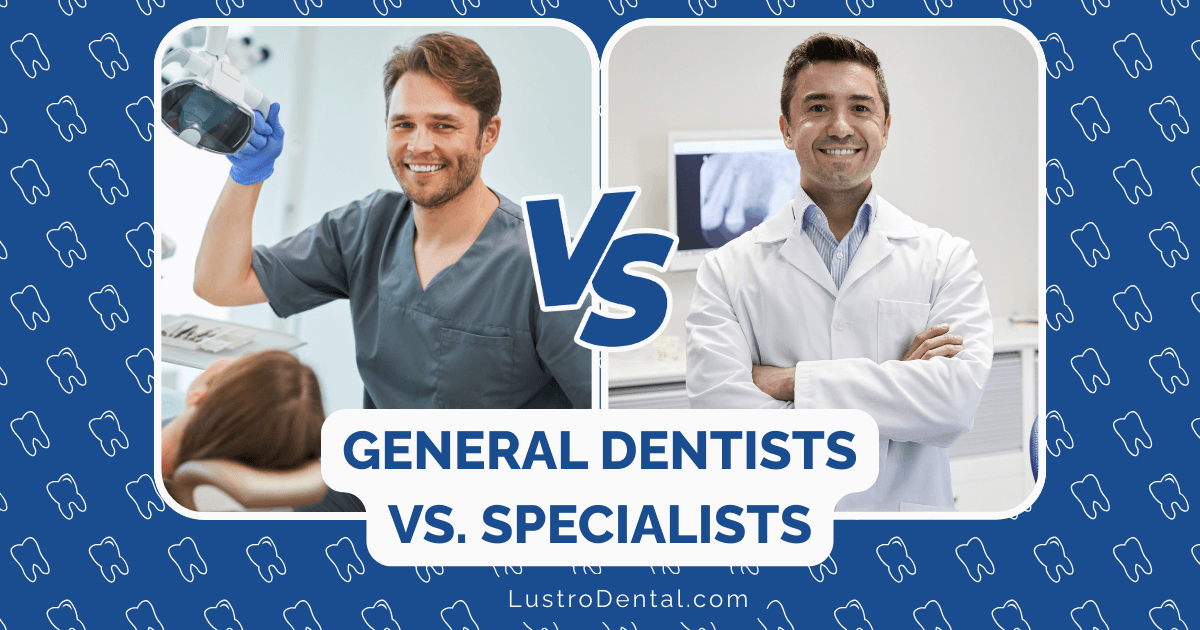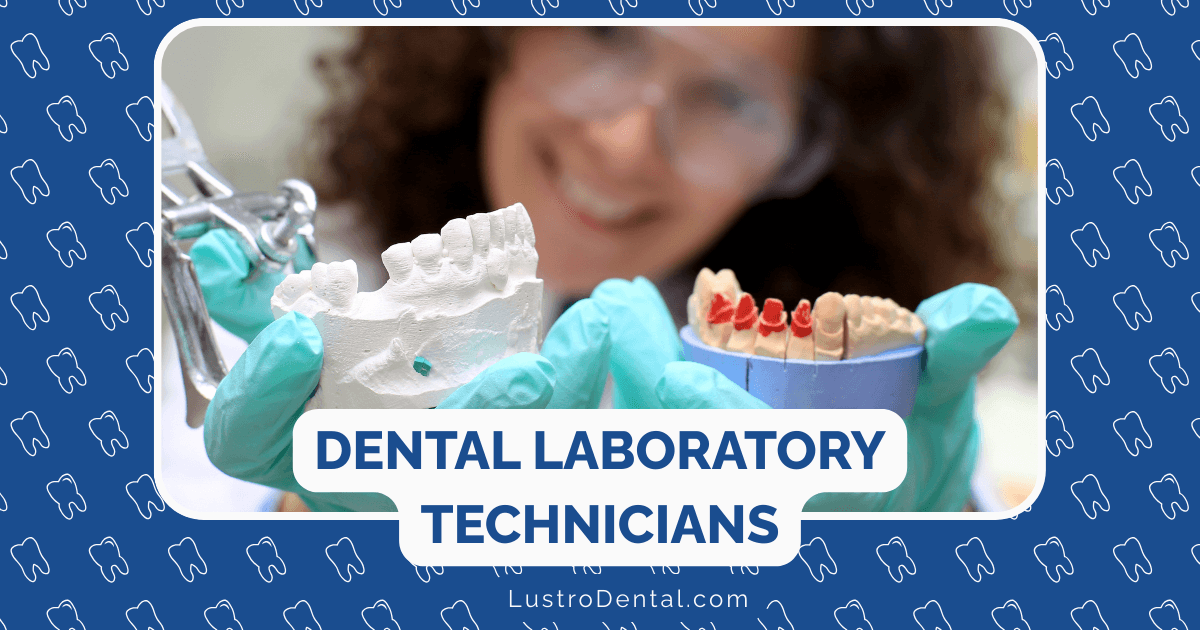Specialist vs. General Dentist: When to See Each

You’re sitting in your general dentist’s chair when you hear those words: “I think we should refer you to a specialist.” Suddenly, what seemed like a routine dental visit has become more complicated—and potentially more expensive.
But when exactly should you see a specialist instead of your regular dentist? And how do you know if that referral is really necessary? Let’s cut through the confusion and break down exactly when you should stick with your general dentist and when a specialist’s expertise is worth the extra time and money.
The Role of Your General Dentist
Think of your general dentist as your oral health quarterback. According to the American Dental Association, general dentists make up about 80% of practicing dentists and handle the majority of dental care needs.
Your general dentist typically provides:
- Regular cleanings and examinations
- X-rays and diagnostic services
- Fillings and simple restorations
- Basic gum care
- Tooth extractions (simple cases)
- Crowns and bridges
- Teeth whitening and basic cosmetic procedures
- Preventive education and care
Dr. James Wilson, a practicing general dentist for over 20 years, explains: “We’re trained to handle about 80-90% of what walks through our door. But knowing when to refer is just as important as knowing what to treat.”
When Your General Dentist Is Enough
For most routine dental needs, your general dentist has the training and equipment to provide excellent care. Stay with your general dentist when:
- You need preventive care: Regular cleanings, checkups, and preventive treatments like fluoride applications or sealants.
- You have a simple cavity: Straightforward fillings are bread-and-butter procedures for general dentists.
- You need a crown or bridge: Most general dentists are well-versed in these common restorative procedures.
- You want basic cosmetic improvements: Procedures like bonding or professional whitening.
- You have a dental emergency: Your general dentist should be your first call for most dental emergencies. They can either treat you or direct you to the appropriate specialist if needed.
Research from the Journal of the American Dental Association shows that outcomes for these common procedures are comparable between general dentists and specialists.
The Dental Specialist Advantage
Specialists undergo 2-4 additional years of training after dental school, focusing intensively on their specialty area. This advanced training equips them with:
- Specialized techniques and skills
- Experience with complex cases
- Advanced technology specific to their specialty
- Deep knowledge of challenging conditions
As Delta Dental notes, “Specialists are to dentistry what specialists are to medicine—experts with advanced training in specific areas.”
Types of Dental Specialists and When to See Them
Endodontist: The Root Canal Specialist
When to see them:
- You need a root canal, especially a complex one
- You have a cracked tooth with pulp involvement
- You’re experiencing persistent tooth pain even after treatment
- You need retreatment of a failed root canal
Red flags that indicate an endodontist referral:
- Your general dentist mentions “calcified canals”
- You have unusual root anatomy
- You’ve had previous unsuccessful root canal treatment
According to the American Association of Endodontists, endodontists perform an average of 25 root canal treatments per week, compared to general dentists who typically do two.
Periodontist: The Gum Specialist
When to see them:
- You have moderate to severe gum disease
- You need gum grafting for recession
- You’re experiencing bone loss around teeth
- You need specialized dental implant placement
- You have persistent gum inflammation despite regular cleanings
Red flags that indicate a periodontist referral:
- Your dentist measures multiple “pockets” deeper than 5mm
- You have visible gum recession
- Your teeth feel loose
- You have a medical condition that impacts gum health (like diabetes)
The American Academy of Periodontology reports that nearly half of American adults have some form of periodontal disease, yet many cases go untreated or undertreated.
Orthodontist: The Alignment Specialist
When to see them:
- You need braces or clear aligners
- You have significant bite issues (overbite, underbite, crossbite)
- You need space management for crowded teeth
- You require treatment for jaw growth issues
- You experience TMJ/TMD symptoms related to bite alignment
Red flags that indicate an orthodontist referral:
- Your bite causes pain or difficulty chewing
- Your teeth are severely crowded or gapped
- Your jaw shifts or makes sounds when opening and closing
Interestingly, according to the American Association of Orthodontists, one in three orthodontic patients today is an adult.
Oral Surgeon: The Surgical Specialist
When to see them:
- You need complex extractions (like impacted wisdom teeth)
- You require jaw surgery
- You need complex implant placement
- You have facial trauma requiring reconstruction
- You have pathology (cysts, tumors) in the oral cavity
Red flags that indicate an oral surgeon referral:
- Your wisdom teeth are partially erupted or impacted
- You have severe facial pain or asymmetry
- You need multiple teeth extracted
Research published in the Journal of Oral and Maxillofacial Surgery indicates that complication rates for complex extractions are significantly lower when performed by specialists.
Prosthodontist: The Restoration Specialist
When to see them:
- You need complex full-mouth reconstruction
- You require specialized dentures or partials
- You have complicated cosmetic or restorative needs
- You need restoration after oral cancer treatment
- You have congenital defects affecting your teeth or jaw
Red flags that indicate a prosthodontist referral:
- You’re missing multiple teeth
- You have severe wear or erosion of teeth
- You need specialized prosthetics
Pediatric Dentist: The Children’s Specialist
When to see them:
- Your child has special healthcare needs
- Your child has extensive decay or complex dental issues
- Your child experiences extreme dental anxiety
- Your child needs specialized behavior management
Red flags that indicate a pediatric dentist referral:
- Your child has developmental delays
- Your child requires sedation for dental work
- Your child has had traumatic dental experiences
The Referral Process: What to Expect
When your general dentist refers you to a specialist, the process typically works like this:
- Explanation of need: Your dentist should clearly explain why they’re referring you.
- Referral coordination: Your dentist’s office may help schedule the appointment or provide contact information.
- Records transfer: X-rays and relevant records are shared with the specialist.
- Specialist consultation: The specialist evaluates your condition and recommends treatment.
- Treatment coordination: Ideally, your general dentist and specialist communicate about your care plan.
- Return to general care: After specialist treatment, you typically return to your general dentist for ongoing care.
Insurance and Cost Considerations
Specialist care typically comes with a higher price tag. According to the Health Policy Institute, patients pay an average of 20-30% more for specialist services compared to the same procedures performed by general dentists.
Before seeing a specialist:
- Check your coverage: Many dental insurance plans cover specialist care, but often at a lower percentage than general dental care.
- Verify network status: Determine if the specialist is in-network with your insurance.
- Get a pre-treatment estimate: Ask the specialist’s office to submit a pre-treatment estimate to your insurance.
- Discuss payment options: Many specialists offer payment plans or financing options.
When to Get a Second Opinion
Not all referrals are created equal. Consider seeking a second opinion when:
- The recommended treatment is extensive or expensive
- You’re unsure if specialist care is truly necessary
- Your general dentist seems uncertain about the diagnosis
- You’re uncomfortable with the treatment plan
A study in the Journal of Dental Research found that approximately 30% of patients who sought second opinions received different treatment recommendations.
Questions to Ask Before Accepting a Referral
Before heading to a specialist, ask your general dentist:
- “Why exactly am I being referred?”
- “What makes this case too complex for general treatment?”
- “What specific expertise does the specialist have that would benefit my situation?”
- “What are the risks if I don’t see a specialist?”
- “Will you continue to be involved in my treatment plan?”
Making the Right Choice for Your Dental Care
The decision between a general dentist and specialist often comes down to:
- Complexity of your case: More complex cases benefit from specialist care
- Comfort level of your general dentist: If they’re hesitant, that’s a sign
- Your risk factors: Medical conditions or complications may warrant specialist care
- Your personal preference: Some patients prefer specialist care for certain procedures
Dr. Sarah Chen, a prosthodontist, offers this advice: “The best dental care happens when general dentists and specialists work as a team, each contributing their unique expertise to benefit the patient.”
The Bottom Line
Your general dentist should be your first stop for most dental concerns. They’re well-equipped to handle the majority of dental issues and can guide you to the right specialist when necessary. Trust their judgment, but don’t hesitate to ask questions or seek a second opinion if you’re unsure.
Remember that the goal of both general dentists and specialists is the same: to provide you with the highest quality care for your specific needs. Sometimes that means staying with your general dentist, and sometimes it means taking advantage of specialized expertise.
By understanding when each type of dentist is appropriate, you can make informed decisions about your oral healthcare—ensuring the best outcomes and the most efficient use of your time and money.
Have you had experiences with dental specialists? Was the referral necessary in your case? Share your experiences in the comments below.







